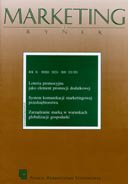Areas of changes in the managing the employees of small and medium enterprises during a pandemic based on the example of the food industry
Human capital is an undisputed value in every organization. In fact, this thesis is confirmed under all economic conditions, both in theory and in practice. The process and areas of human capital management are liable to change. Research on change is very important, and conclusions can be a source of recommendations for business practitioners. The aim of the article is to identify areas of change in scope of human resources management, in particular in the area of time work and motivations that have occurred as a result of the counteraction the effects of the pandemic in small businesses of the food industry of Podlaskie Voivodeship. The study indicates the areas of employee management which are the most susceptible to crisis situations in the turbulent business environment of small food industry companies in the region. The inference was based on the analysis results of own research carried by questionnaire which was directed to Podlasie food producers.The main research hypothesis is to claim that pandemic period has forced changes in human resources management, particular in the area of working time and motivation in small enterprises in food industry. Assessing the impact of pandemic on changes in the main areas of the company's activity and definding the opportunities and threats it creates the current crisis for the development of small food industry companies from the region is an additional goal of the study.
References
Bibliografia/Reference
Ambroziak, Ł. (2020). Wpływ pandemii COVID-19 na handel rolno-spożywczy Polski: pierwsze doświadczenia. Problemy Rolnictwa Światowego, 20(35), 5-17.
Baldwin, R. i Tomiura, E. (2020). Thinking Ahead about the Trade Impact of COVID-19. W: R. Baldwin, B. W. di Mauro (red.), Economics in the Time of COVID-19 (59–1). London: CERP Press.
Bogdanienko, J. (2020). Ryzyko i kryzys w procesie rozwoju organizacji. Warszawa: CeDeWu.
Chudziński, P., Cyfert, S., Dyduch, W. i Zastempowski, M. (2020). Projekt Sur (vir) val: czynniki przetrwania przedsiębiorstw w warunkach koronakryzysu. e-mentor, 5(87), 34–44.
Clauss, T., Kraus, S., Kallinger F. L., Bican, P., Brem, A. i Kailer, N. (2020). Organizational ambidexterity and competitive advantage: The role of strategic agility in the exploration-exploitation paradox. Journal of Innovation & Knowledge, 7(10), 904–911.
Dolot, A. (2020). Wpływ pandemii COVID-19 na pracę zdalną — perspektywa pracownika. e-mentor, 1(83), 35–43.
Garcia, H. F. (2006). Effective leadership response to crisis. Strategy & Leadership, 34(1), 4–10.
Griffin, R. W. (2017). Podstawy zarządzania organizacjami. Warszawa: Wydawnictwo Naukowe PWN.
HBR (2015). Leadership Insights. Harvard Business School Publishing Corporation.
Instytut Humanites (2021). Bariery i trendy. Transformacja technologiczna firm w Polsce. Fundacja Humanites.
Mitręga-Niestrój, K. (2012). Skutki światowego kryzysu finansowego w sferze realnej — ujęcie międzynarodowe. Studia Ekonomiczne, 122, 159–171.
Moczydłowska, J. (2014). Barriers and difficulties in talent management. Przedsiębiorczość i Zarządzanie, 15(6), 231–241.
Paszkowski, J. (2010). Zmiany w stanie i strukturze przedsiębiorstw w województwie podlaskim na tle Polski. W: E. Orechwa-Maliszewska i J. Paszkowski (red.), Finanse i zarządzanie przedsiębiorstwem w warunkach kryzysu (315–334). Białystok: Wyższa Szkoła Finansów i Zarządzania w Białymstoku.
Polski Instytut Ekonomiczny (2020). Szlaki handlowe po pandemii COVID-19. Warszawa: PIE.
Walecka, A. i Zakrzewska-Bielawska, A. (2010). Determinanty zachowań menedżerów w sytuacji kryzysu. Prace i Materiały Wydziału Zarządzania Uniwersytetu Gdańskiego, 4(1), 287–296.
World Trade Organization (2020). Cross-border mobility, COVID-19 and global trade. WTO.
Zakrzewska-Bielawska, Z. (2016). Paradoks eksploracji i eksploatacji - ambidexterity w zarządzaniu strategicznym. Strategie. Procesy i praktyki, 420, 435–449.
http://www.biznes.gov.pl (09.06.2021)
https://www.rp.pl/ (16.06.2021)
https://polskiprzemysl.com.pl/ (17.06.2021)

